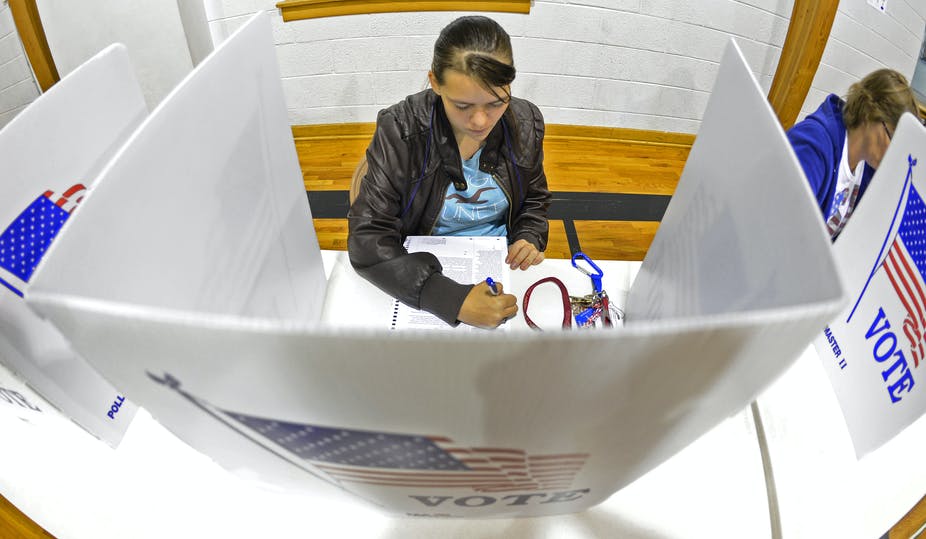Lee Jarvis draws on The Handmaid’s Tale to try to make sense of President Trump’s first days in office
The excesses and absurdities of Donald Trump’s first few days in office have left many of us groping for appropriate ways to make sense of, and respond to, a President of the United States- the President of the United States of America- explicitly defending torture, signing executive orders to facilitate the building of ‘a contiguous, physical wall or other similarly secure, contiguous, and impassable physical barrier’ on the US-Mexico border, taking action against abortion, and introducing a new travel ban whose targets include anyone arriving to the US from the Muslim-majority countries of Iraq, Syria, Iran, Libya, Somalia, Sudan, and Yemen. Confronted with these actions, several commentators have turned to dystopian fictions- especially George Orwell’s 1984– to make sense of this administration’s eager marriage of executive and discursive power, evident, most egregiously, in Kellyanne Conway’s almost-impressively straight-faced invocation of ‘alternative facts’.
One dystopian resource mentioned in at least one such effort is Margaret Atwood’s The Handmaid’s Tale: a work of ‘speculative fiction’ exploring the intersection of gendered, classed and (less explicitly) racialised hierarchies. In Atwood’s tale, political power becomes most clearly manifested in the regimented control of women’s bodies that marks the emergence of a new social order following a ‘catastrophe, when they shot the President and machine-gunned the Congress and the army declared a state of emergency’ (Atwood 1996: 182-183). As Atwood’s (1996: 183) narrator- Offred (literally, ‘Of Fred’)- explains:
They blamed it on the Islamic fanatics, at the time. Keep calm, they said on television. Everything is under control. …That was when they suspended the Constitution. They said it would be temporary. There wasn’t even any rioting in the streets. People stayed home at night, watching television, looking for some direction. There wasn’t even an enemy you could put your finger on.
And, as Offred continues, initial bemusement, perhaps even acquiescence, gradually gave way to a normalization of intrusive security powers in the name of ‘our’ collective security from an ambiguous and, indeed, slowly-vanishing threat:
Newspapers were censored and some were closed down, for security reasons they said. The roadblocks began to appear, and Identipasses. Everyone approved of that, since it was obvious you couldn’t be too careful. They said that new elections would be held, but that it would take some time to prepare for them. The thing to do, they said, was to continue on as usual (ibid).
Atwood’s novel, I think, sheds useful light on two key dynamics that have marked counter-terrorism developments in the last week or so. The first of these dynamics is a temporal one, and relates to the importance of claims to exceptionality in the construction, justification and acceptance of often-significant security measures. Terrorist attacks (in the recent past) or threats (in an imminent future) are frequently represented as a radical interruption of normality: as an exceptional break from the quotidian banality of everyday social and political life. There is no more obvious example of this than 9/11 which was widely written as a dividing point between (secure) past and (dangerous) future. As then National Security Advisor Condoleezza Rice (cited in Jarvis 2009: 64) put it less than a month after those attacks-attacks, indeed, that were also invoked by President Trump in his signing of his ‘extreme vetting’ Executive Order:
September 11th was one of those rare dates that forever divides history into distinct categories of before and after. Everyone will remember what he or she was doing on September 11th. It was a day when the dark and impossible became a horrific reality for our country and for the world. We commonly hear the refrain that everything changed on September 11th. In many ways that is true.
A similarly exceptional logic does much of the work needed for the sense of urgency underpinning President Trump’s #muslimban. As the President recently tweeted, doing nothing in the current situation is simply not an option: ‘Our country needs strong borders and extreme vetting, NOW’. This is because, as outlined at the CIA headquarters:
We have to get rid of ISIS. Have to get rid of ISIS. We have no choice. …This is a level of evil that we haven’t seen. And you’re going to go to it, and you’re going to do a phenomenal job. But we’re going to end it. It’s time. It’s time right now to end it (my emphasis).
What should not, however, be missed in these claims of radical temporal discontinuity confronting both the American public and – in Atwood’s novel, Offred- is that they dovetail with a seemingly antithetical argument that the exceptional response to exceptional circumstances is also– at the same time- representative of normality. Things are returning- or, at least, things will return- to the way they previously were, in the past, as long as we accept these temporary security measures (which might turn out to be rather more than temporary). President Trump’s accompanying statement to his Executive Order on ‘extreme vetting’, for instance, highlighted continuities both with enduring American values (more on these below) and with the actions of his immediate predecessor:
America is a proud nation of immigrants and we will continue to show compassion to those fleeing oppression, but we will do so while protecting our own citizens and border. America has always been the land of the free and home of the brave. We will keep it free and keep it safe, as the media knows, but refuses to say. My policy is similar to what President Obama did in 2011 when he banned visas for refugees from Iraq for six months.
The second dynamic pointed to by Atwood is that these claims to various pasts, presents and futures which underpin the politics of security also rely upon specific identity claims. The past which we have either now left (because of the logic of emergency) or to which we may return (if we accept the logic of emergency and its consequences) is, of course our past. It is ‘we’ who have either moved away from or toward a (mythical, imaginary) version of ourselves characterised by particular principles, norms or ways of life.
The problem, however, is that identity claims are inherently contestable, as we have seen with the critiquing of Trump’s travel ban by other Americans including Republican lawmakers, and former Presidents and Vice Presidents, all of whom have articulated equally powerful claims to ‘the American’ self-identity and its values. Identities are contingent, rather than essential: they come into being through practices and performances that, amongst other things, posit distinctions between ‘us’ and ‘them’. That is why efforts to shore up the self so frequently run into opposition from those who would story- and secure- the self rather differently. As Senator Charles Schumer put it, so powerfully:
…tears are running down the cheeks of the Statue of Liberty tonight as a grand tradition of America, welcoming immigrants, that has existed since America was founded has been stomped upon
Those within the United States seeking to maintain a coherent distinction between ‘us’ and ‘our values’ so threatened by ‘them’ might benefit, once more, from a flick through The Handmaid’s Tale. Everyone able to do so- and some that are coerced to do so- flaunts the new administration’s rationale and rules in some way or other, transgressing norms relating to speech, sex and beyond. Even so authoritarian, so hierarchical, a regime as Gilead fails to maintain its strict sense of self-identity, however severe and spectacular the punishments for would-be or forced-to-be miscreants.
Defenders of American borders and values might also, however, take heed from recent developments across the Atlantic- and the apparent collapse of the United Kingdom’s new counter-extremism bill. The continuing failure of the British government to define this bill’s object- extremism- and its subject- ‘British values’ – offers as good a cautionary note as any about the limitations of boundary-drawing in the name of national security. As this experience shows, the distinction between ‘us’ and ‘them’ is far less certain, and far less fixed, than populist appeals to new threats would have us believe. Notions of ‘British values’- as with notions of ‘American values’- strain, and ultimately collapse, under attempts to pin down and secure them from external threats; whether those attempts involve the construction of tighter definitions, higher walls, or new immigration regimes.
Image Credit:Flickr
Dr Lee Jarvis is Reader in International Security at the University of East Anglia





